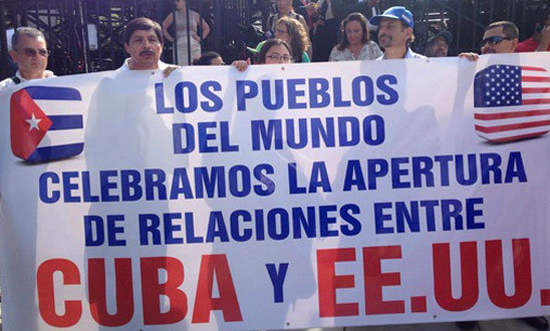
On 20 July, seven months after Cuba and the United States announced plans to restore diplomatic relations, embassies were opened in Havana and Washington. They were closed 54 years ago, in 1961. In 1977, ‘Interest Sections’ were opened up to function as substitute embassies but with fewer staff and functions. The restoration of embassy status, along with the removal of Cuba from the state sponsors of terrorism list in May 2015, marks the official re-establishment of diplomatic relations.
Cuba’s Foreign Minister Bruno Rodriguez attended the inauguration of the embassy in Washington. Hundreds gathered outside the embassy to celebrate the occasion chanting their support for revolutionary Cuba. In his speech Rodriguez declared: ‘The historic events we are living today will only make sense with the removal of the economic, commercial and financial blockade, which causes so much deprivation and damage to our people; the return of occupied territory in Guantanamo; and respect for the sovereignty of Cuba.’ Cuba’s insistence on these demands is ignored by those who ‘accuse Cuba of renouncing socialism and anti-imperialism because they equate the restoration of diplomatic relations with an ‘embrace’ of US capitalism. These critics fail to grasp the significance of Cuba’s victory. Half a century ago revolutionary Cuba was isolated as every country in Latin America, except Mexico, broke off diplomatic relations. Now the US has been forced to restore diplomatic relations with Cuba to end its own isolation. It was the only country in the Western Hemisphere without an embassy in Havana.
The Cuban flag was also raised, without ceremony, in the US State Department prior to Rodriguez’s meeting there with US Secretary of State, John Kerry. During the meeting, Rodriguez said Cuba recognised President Obama’s efforts to urge the US Congress to end the blockade and ‘his willingness to adopt executive measures that modify the implementation of some aspects of this policy’, adding that Obama could go further in the use of executive powers to dismantle the blockade.
The US Secretary of State John Kerry will formally inaugurate the US embassy in Havana on 14 August. Obama told the White House that the embassy would ‘substantially increase our contacts with the Cuban people’. Clearly, the US objective of regime change to destroy Cuban socialism remains. With increased staff and functions, the US embassy in Havana will provide new avenues for pursuing this strategy. Aware of this threat, Raul Castro has insisted that the US adhere to the Vienna Convention on Diplomatic Relations prohibiting interference by embassy staff in the internal affairs of host nations.
Harriet Taylor and Helen Yaffe
FRFI 246 August/September2015




